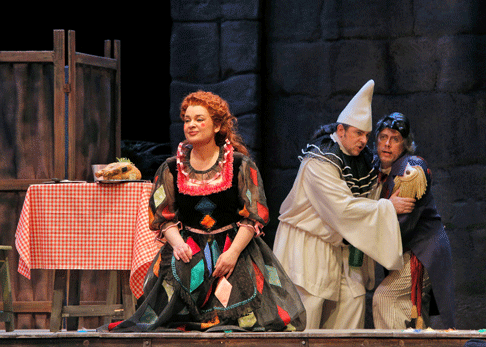Director Andrew Sinclair brought out all the passion and violence of its verismo story and did not allow an intermission to dilute any of its dramatic punch.
Ruggero Leoncavallo (1857-1919) grew up in a small town in Calabria and he set his opera Pagliacci in just such a place. The composer’s father was a judge and he said he got the idea for the original story on which he based his opera from one of his father’s cases. That may or may not be true because French author Catulle Mendès thought the story of the opera closely resembled his 1874 play La Femme de Tabarin in which a clown murders his wife. Leoncavallo wanted to compose a verismo opera because he had already witnessed the popularity of Pietro Mascagni's Cavalleria rusticana in 1890.
Leoncavallo knew that story would make a good opera so he used it in writing his libretto. Then he set it to dramatic music. He had been trying unsuccessfully to get one of his operas staged for years. Pagliacci turned the tide. He was able to get it performed in 1892 at the Teatro Dal Verme in Milan where it was a triumph with audience and critics alike. Only its conductor, Arturo Toscanini, found it wanting. Mendès sued Leoncavallo for plagiarism, but dropped the suit when he was accused of copying some of his works. Toscanini’s comment was easily forgotten and Pagliacci was soon on its way to worldwide popularity.
Originally titled Il pagliaccio (The Clown), the creator of the role of Tonio, Victor Maurel, asked that the name be changed to Pagliacci (Clowns) because he thought it should include more of the cast. Tonio originally sang final line, “La commedia è finita,” until Enrico Caruso began to sing it as Canio.
 Adina Nitescu as Nedda, Frank Poretta as Canio and Stephen Powell as Tonio
Adina Nitescu as Nedda, Frank Poretta as Canio and Stephen Powell as Tonio
On January 28, San Diego Opera presented Pagliacci as the opening production of the 2014 season. Often staged along with another opera such as Mascagni’s Cavalleria rusticana, this Pagliacci faced the opera world alone. Director Andrew Sinclair brought out all the passion and violence of its verismo story and did not allow an intermission to dilute any of its dramatic punch. Scenic director John Coyne set the action in a simple out-of-doors scene with a blooming tree signifying summer in the small Italian town. Baritone Stephen Powell sang the Prologue with stunning and powerful tones. As it turned out, it was the best-sung aria of the evening.
When the curtain rose, the townspeople and circus performers were clothed in Ed Kotanen's authentic early twentieth century costumes. Traveling circus company members were setting up the well-worn platform stage and numerous benches that they carried with them from town to town. After seeming to be a straightforward character when he sang the Prologue, Tonio skulked about the stage when interacting with the other performers. He was a misfit who probably could not get work elsewhere. As Canio, Frank Poretta, was a jovial character whose main purpose was to lure an audience to the troupe’s performances. He sang with a secure, fluid line. Nedda, Canio’s unhappy trophy wife, looked forward to her tryst with her younger lover, Silvio, as she sang her aria about the freedom of the birds overhead. Adina Nitescu is a dramatic soprano and her tones were stronger and darker than the ones expected from Nedda. When Tonio tried to kiss her, Nedda grabbed a whip and beat him until he limped off harboring thoughts of a grisly revenge.
Little by little Tonio infected Canio’s mind until he lapsed into insane jealousy. For Sinclair, this was Tonio’s story, and he made sure the audience saw that the ugly clown was pulling all the strings to make the murder happen. That’s why this time it was Tonio who ended the opera with “La commedia è finita.” Joel Sorensen was a worthy Beppe and David Adam Moore a handsome, vocally sensuous Silvio. Directed by chorus Master Charles F. Prestinari, the choristers sang with delicious harmonies as they portrayed rural townspeople. Yves Abel underscored Sinclair’s dramatic tone with his brisk interpretation of Leoncavallo’s music and his orchestra responded with dramatically alert playing. This was a short but emotionally stunning performance of a well loved verismo opera.
Maria Nockin
Cast and production information:
Tonio, Stephen Powell; Canio, Frank Poretta; Beppe, Joel Sorensen; Nedda, Adina Nitescu; Silvio, David Adam Moore; Conductor, Yves Abel; Director, Andrew Sinclair; Scenic Designer, John Coyne; Costume Designer, Ed Kotanen; Lighting Designer, Michael Whitfield; Chorus Master Charles F. Prestinari.

